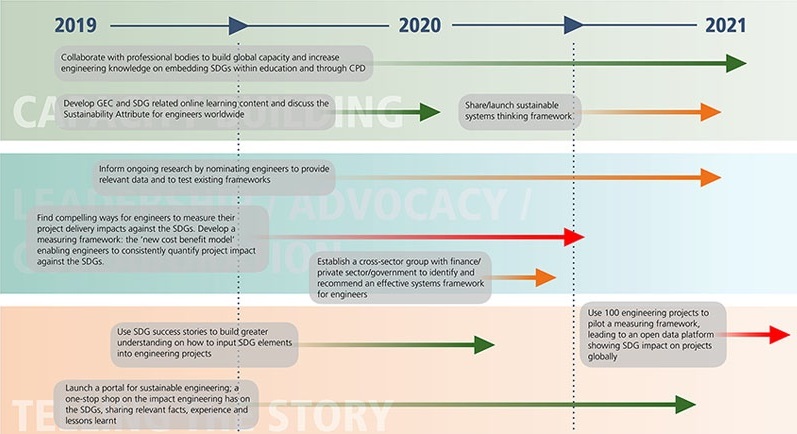ICE launches engineering route map to deliver UN SDGs

|
| The Sustainability Route Map: working groups have been set up to tackle three key areas of action. |
ICE has launched a Sustainability Route Map, outlining a three-year plan for the global engineering community to better engage with the United Nations Sustainable Development Goals (SDGs) and demonstrate the impact of engineering projects.
To tackle each of the route map’s three key areas for action, ICE has set up working groups to deliver progress by 2021.
The Measuring, Monitoring and Reporting working group will evaluate current methods and provide a framework that allows engineers to consistently measure and report on the SDG impact of their infrastructure projects or programmes.
The Systems Approach working group will help engineers to adopt a collaborative, outcome-based system for delivering infrastructure, shifting away from self-contained single projects.
The Global Knowledge Sharing working group will bring UK and international professional engineering bodies together to increase SDG knowledge through education and continuing professional development (CPD).
[edit] Global Engineering Congress
The three areas of focus were established following the work of the Global Engineering Congress (GEC), which ICE hosted in October 2018. GEC brought together thousands of engineers from over 80 countries across the world to determine how to make the delivery of the SDGs a reality.
Davide Stronati, Chair of the ICE Sustainability Leadership Team and member of the GEC Legacy Strategic Steering Group, said: “Engineers are ideally placed to answer the many challenges the world faces, and GEC was a unique opportunity for the worldwide engineering community to turn words into action towards the UN sustainable development goals.
“Based on the wealth of knowledge, innovation and ideas that were shared at GEC, ICE has developed a sustainability route map to transform the way engineers engage with the SDGs.
"Over the next three years, our dedicated working groups will increase SDG knowledge throughout the profession and establish a way for infrastructure projects to align effectively and make a measurable impact against the SDGs.”
[edit] About this article
This article was written by Vien McMasters of the ICE. It was first published on the ICE website and can be accessed here.
[edit] Related articles on Designing Buildings Wiki
- Climate change science.
- Earth overshoot day.
- Ecological impact assessment.
- Energy.
- Energy certificates.
- Energy Performance Certificates.
- Energy Related Products
- Energy targets.
- Environmental impact assessment.
- Environmental legislation.
- ICE President Rachel Skinner presents Shaping Zero.
- Intergovernmental Panel on Climate Change.
- National Planning Policy Framework.
- Site waste management plan.
- Sustainable development.
- Sustainable materials.
- Sustainable urban drainage systems.
- Why all civil engineers should sign up to this pledge.
Featured articles and news
Statement from the Interim Chief Construction Advisor
Thouria Istephan; Architect and inquiry panel member outlines ongoing work, priorities and next steps.
The 2025 draft NPPF in brief with indicative responses
Local verses National and suitable verses sustainable: Consultation open for just over one week.
Increased vigilance on VAT Domestic Reverse Charge
HMRC bearing down with increasing force on construction consultant says.
Call for greater recognition of professional standards
Chartered bodies representing more than 1.5 million individuals have written to the UK Government.
Cutting carbon, cost and risk in estate management
Lessons from Cardiff Met’s “Halve the Half” initiative.
Inspiring the next generation to fulfil an electrified future
Technical Manager at ECA on the importance of engagement between industry and education.
Repairing historic stone and slate roofs
The need for a code of practice and technical advice note.
Environmental compliance; a checklist for 2026
Legislative changes, policy shifts, phased rollouts, and compliance updates to be aware of.
UKCW London to tackle sector’s most pressing issues
AI and skills development, ecology and the environment, policy and planning and more.
Managing building safety risks
Across an existing residential portfolio; a client's perspective.
ECA support for Gate Safe’s Safe School Gates Campaign.
Core construction skills explained
Preparing for a career in construction.
Retrofitting for resilience with the Leicester Resilience Hub
Community-serving facilities, enhanced as support and essential services for climate-related disruptions.
Some of the articles relating to water, here to browse. Any missing?
Recognisable Gothic characters, designed to dramatically spout water away from buildings.
A case study and a warning to would-be developers
Creating four dwellings... after half a century of doing this job, why, oh why, is it so difficult?
Reform of the fire engineering profession
Fire Engineers Advisory Panel: Authoritative Statement, reactions and next steps.
Restoration and renewal of the Palace of Westminster
A complex project of cultural significance from full decant to EMI, opportunities and a potential a way forward.
Apprenticeships and the responsibility we share
Perspectives from the CIOB President as National Apprentice Week comes to a close.


























